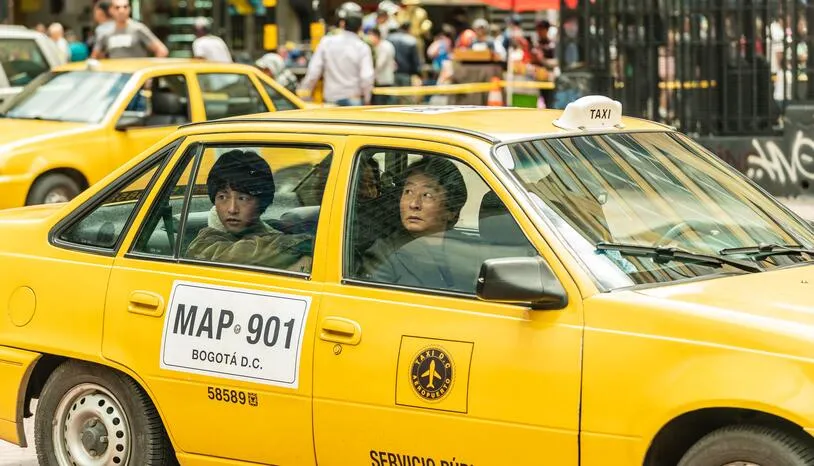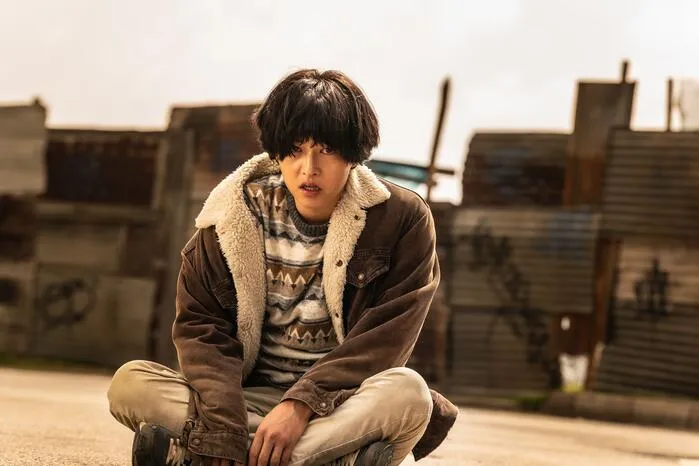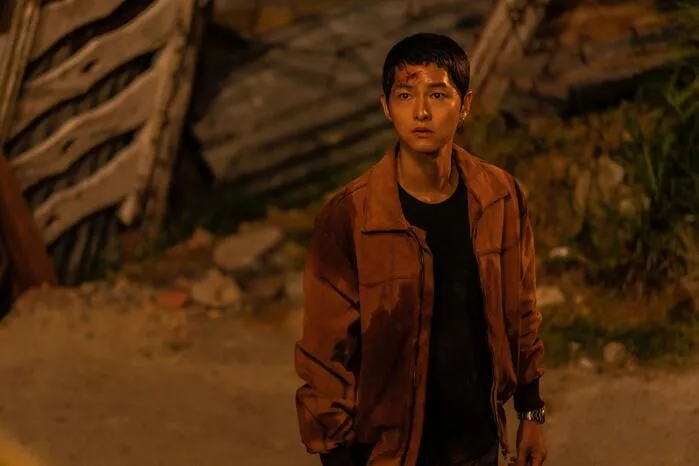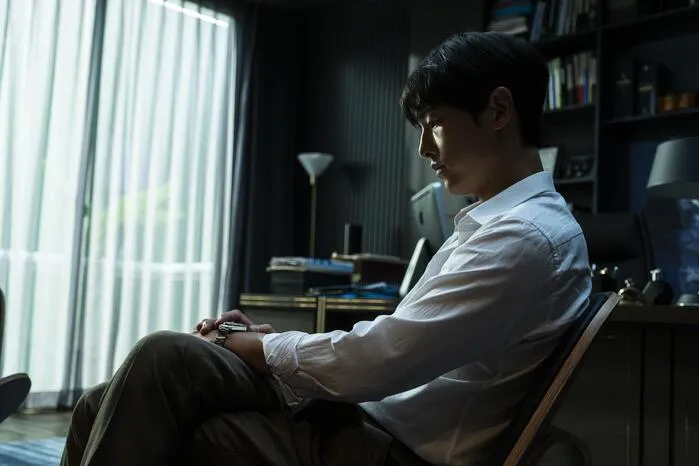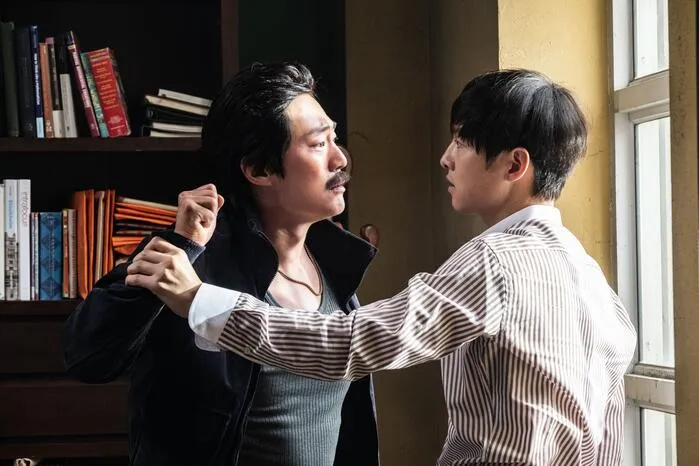Bogota: City of the Lost begins with the impact of the 1997 Asian financial collapse. For Kook-hee and his family, this economic turmoil drives their escape from a disintegrating South Korea to Bogotá’s chaotic streets. The film establishes a cultural conflict that shapes the narrative. What emerges is an immigrant story intertwined with a tense, crime-driven drama where survival tests physical and moral limits.
The story explores ambition, betrayal, and global economic pressures. Kook-hee transforms from a timid newcomer to a significant figure in a Korean-run smuggling operation in Colombia. The narrative reveals power dynamics between characters and within Kook-hee’s internal struggles.
Loyalty becomes fragile as ethical boundaries blur, leading toward an inevitable confrontation. While the central plot follows a familiar trajectory of an underdog becoming a leader, the tension between Korean immigrant experiences and Colombian surroundings creates compelling dramatic depth.
The film explores an emotional journey where Kook-hee’s path through the criminal underworld reflects immigrant challenges. His struggle represents the universal experience of newcomers in an unfamiliar, challenging environment—driven by desperation and the desire to reshape personal destiny. This personal narrative against a complex socio-political backdrop elevates the story beyond a typical crime drama.
A Familiar Arc in a Foreign Land: The Plot and Structure of Bogota: City of the Lost
Bogota: City of the Lost tracks Kook-hee’s path from desperate immigrant to criminal operator. The story begins with his family seeking shelter in Bogotá, Colombia, after the 1997 Asian financial crisis destroys their life in South Korea. A robbery leaves them without resources.
Sergeant Park, an old family connection, introduces them to illegal garment smuggling. Kook-hee shifts from a timid newcomer to a calculating figure within criminal networks.
The narrative echoes familiar crime story patterns. Kook-hee’s trajectory follows standard genre expectations—proving himself, creating connections, betraying allies, and reaching a powerful position. His path reveals the steep price of unchecked ambition. Standard genre mechanics guide his progression through criminal landscapes.
The film struggles with storytelling rhythm. Initial scenes capture Kook-hee’s early challenges with documentary-like precision. Later sequences become predictable, recalling similar crime narratives seen in other works.
Kook-hee’s internal struggles remain unexplored—his moral conflicts, family tensions, and personal transformations receive minimal attention. He emerges as a functional character rather than a complex individual, moving through plot points without deep emotional weight.
The cinematic experience presents a standard exploration of criminal ascension, trapped within genre constraints without breaking new ground.
The Shifting Faces of Bogota: Character Development and Performances
Kook-hee sits at the center of Bogota: City of the Lost. His story tracks a typical immigrant experience: arriving vulnerable, then gradually embracing criminal strategies for survival. The film charts his path from desperation to calculated aggression, though emotional depth remains elusive.
Kook-hee’s transformation from passive newcomer to strategic criminal operator feels mechanical. Glimpses of internal conflict emerge through his relationship with his father and shifting moral landscape. Yet these moments never fully resonate. The character moves through predictable genre rhythms without revealing deeper personal motivations.
Supporting characters receive minimal development. Sergeant Park functions as a mentor guiding Kook-hee into criminal networks. Their relationship remains superficial, lacking meaningful exploration. Soo-young appears as a potential rival, but the tension between characters feels underdeveloped.
Song Joong-ki portrays Kook-hee with controlled restraint. His performance captures the character’s internal shifts with subtle precision. Lee Hee-joon brings energy to Soo-young, creating momentary sparks of intensity. Kwon Hae-hyo plays Sergeant Park with veteran reliability, though limited by a stereotypical character framework.
The film’s performances hint at potential depth. Song’s measured approach reveals Kook-hee’s quiet desperation. Supporting actors inject brief moments of complexity. Still, the narrative struggles to transform these performances into a compelling character study.
The Cultural Underpinnings of Bogota: Themes of Immigration and Identity
Bogota: City of the Lost uses the 1997 Asian financial crisis as a launching point for Kook-hee’s family story. Economic collapse drives them from South Korea to Colombia’s challenging streets.
The film tracks Kook-hee’s transformation from hopeful newcomer to criminal operator. Economic devastation emerges as a raw motivation for survival, yet the exploration remains surface-level. The IMF crisis creates pressure, but its deeper psychological impact goes unexplored.
Kook-hee’s immigrant journey follows predictable patterns. His family struggles to adapt in a new country, with Kook-hee gradually sinking into criminal networks. The experience of displacement creates tension, but the narrative relies on standard storytelling approaches. Social and political complexities remain largely unexamined.
Colombia appears as a mere backdrop for the Korean characters’ story. The film sidesteps local cultural depth, presenting a shallow representation of place. Korean immigrant experiences dominate the narrative, leaving Colombian perspectives silent. Local society receives minimal attention, reduced to occasional glimpses of violence or economic struggle.
The storytelling fails to engage with cultural nuances. Korean characters occupy the center, while Colombian contexts remain peripheral. Power dynamics within the immigrant community receive cursory treatment. Local voices remain unheard, creating a one-dimensional portrayal of cultural interaction.
Kook-hee’s journey emerges as a generic crime narrative wrapped in an international setting. The film skims the surface of cultural complexity, preferring familiar genre conventions over deeper exploration.
Tone and Genre: Navigating the Tightrope Between Comedy and Drama
Bogota: City of the Lost walks between dark comedy and crime narrative. The film opens with strange moments surrounding Kook-hee’s entry into smuggling. Odd scenarios involving lingerie and winter clothing create initial comedic tension. Satirical elements highlight the ridiculous nature of building a criminal enterprise. Dry humor punctuates early scenes, revealing the absurd world Kook-hee enters.
Sudden shifts between comedy and serious drama create narrative tension. Kook-hee’s awkward criminal beginnings transform into darker sequences. Comedic moments clash with brutal betrayals, disrupting audience expectations. The film struggles to maintain a consistent emotional tone. Attempts at humor undermine the story’s dramatic weight.
The crime saga follows standard genre patterns. Kook-hee’s path tracks predictable stages: criminal entrance, network building, and potential downfall. Typical narrative beats dominate the storytelling. Kook-hee’s criminal trajectory lacks unexpected turns. Familiar genre structures restrict the film’s potential for deeper exploration. Standard plot progression prevents meaningful character investigation.
The narrative remains trapped between comedic glimpses and crime drama expectations. Kook-hee’s journey feels constrained by genre limitations. Emotional complexity gives way to predetermined storytelling rhythms. Satirical elements fail to elevate the standard crime narrative structure.
Visuals and Technical Aspects: The Cinematic Canvas of Bogota
Bogotá deserves a cinematic portrayal that captures its complex spirit. Bogota: City of the Lost struggles to represent the city’s true essence. The film’s visual approach flattens Bogotá’s rich landscape. Cinematography fails to reveal the city’s intricate character. Urban scenes appear generic, stripping away local texture and depth.
Filmed on location, the movie neglects Bogotá’s vibrant energy. Street scenes lack distinct Colombian atmosphere. Urban spaces feel disconnected from their cultural context. The visual narrative misses opportunities to explore cultural intersections. Cityscape becomes a bland background instead of a living character.
Production design remains disappointingly standard. Costumes and visual elements lack creative spark. The film’s aesthetic feels uninspired and functional. Compared to other crime narratives that transform settings into powerful storytelling tools, Bogota appears visually muted. Character environments receive minimal artistic treatment.
Kook-hee’s world lacks visual complexity. Cinematographic choices flatten the potential for cultural tension. Missed opportunities for visual storytelling weaken the narrative’s emotional impact. The film’s visual language fails to communicate the underlying cultural conflicts.
Conclusion and Final Thoughts: A Crime Drama Stuck in the Mundane
Bogota: City of the Lost presents a story of South Korean immigrants navigating Colombian criminal networks during the 1997 Asian financial crisis. The film’s core concept creates immediate tension.
Cultural collisions between immigrants and local environments spark narrative potential. Song Joong-ki performs Kook-hee with magnetic intensity. His character shifts from vulnerable newcomer to calculated criminal operator.
The narrative struggles with genre limitations. Standard crime drama patterns restrict storytelling depth. Characters lack meaningful development. Emotional complexity remains unexplored. Kook-hee’s transformation feels mechanical rather than nuanced. Supporting performances add minimal texture to the storyline.
South Korean immigrant experiences emerge as the strongest element. The film hints at cultural displacement and survival strategies. Criminal world interactions create momentary dramatic sparks. Kook-hee’s journey suggests wider themes of adaptation and desperation. Yet these narrative threads remain superficially connected.
Performance elements prevent complete narrative collapse. Song Joong-ki brings physical and emotional commitment to Kook-hee. Subtle character shifts reveal internal conflicts. Supporting actors create brief moments of genuine tension. Criminal world interactions suggest deeper potential left unexamined.
The Review
Bogota: City of the Lost
Bogota: City of the Lost explores a South Korean immigrant's criminal journey in Colombia. Song Joong-ki performs Kook-hee with intense commitment. The film wrestles with narrative challenges. Cultural interactions remain partially unexplored. Crime drama elements create sporadic tension.
PROS
- Strong central performance by Song Joong-ki.
CONS
- Predictable plot with few narrative surprises.
- Underdeveloped characters and lack of emotional depth.
- Inconsistent tone, shifting awkwardly between dark comedy and serious drama.
- Missed opportunity to deeply explore Colombian culture.







































